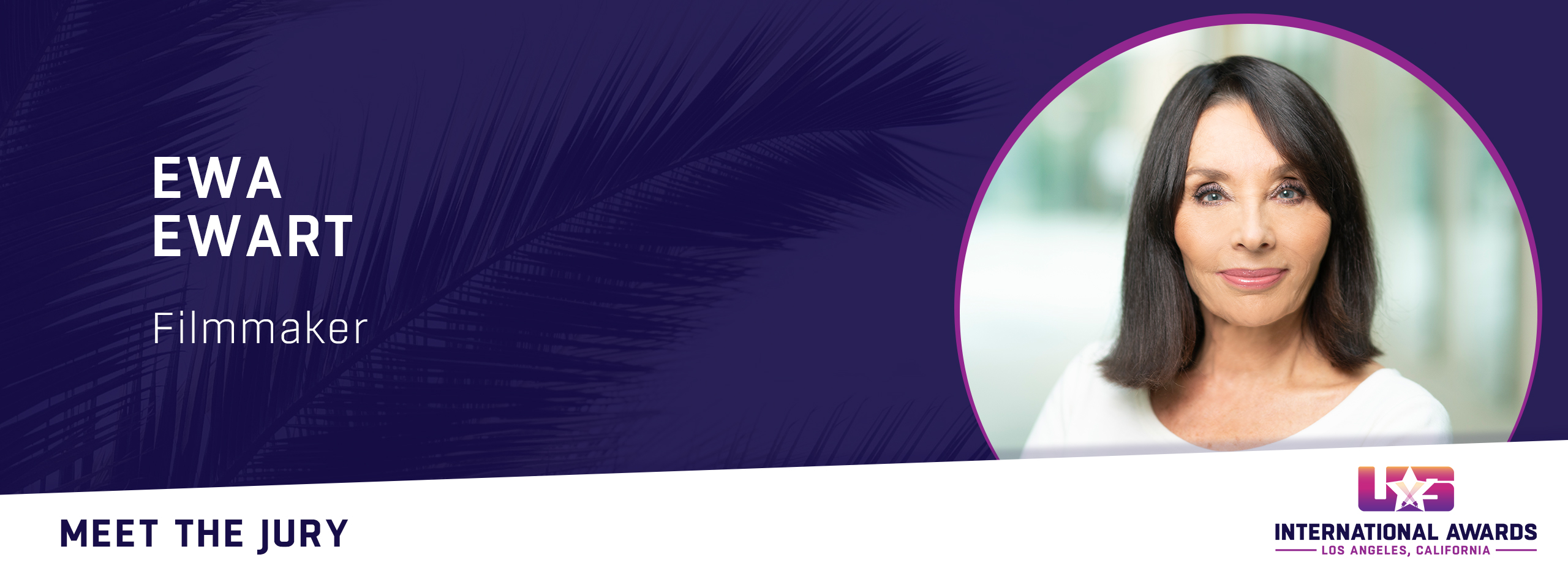
Ewa Ewart is a journalist and an award-winning filmmaker who specializes in groundbreaking and influential documentaries. Born and raised in Poland, she spent most of her career based at BBC TV in London, England. She has traveled and worked in many countries, producing and directing programs ranging from investigations and political to social observational documentaries.
We are thrilled to have you on the jury for the 2024 US International Awards. Please tell us more about your work background and your everyday work life. Could you also tell us what you enjoy the most in your job?
My journalistic background is in TV News. I learned about documentary filmmaking at the BBC in London. Back in the 1990s, it was a golden era for documentaries. There was money, and we traveled the world making films on various fascinating and relevant subjects. It was an inspiring stretch of my work as a filmmaker, and it lasted a good few years. I am now a freelancer and enjoy the freedom of freelancing offers. However, raising funds for a project can sometimes be daunting and time-consuming. I never had to worry about getting budgets for my films while working for the BBC.
What do you enjoy the most in your job?
I love the documentary format for many reasons, but one is of critical importance: documentaries offer you enough space to tell what happened and why it happened. It was the main reason I eventually had enough of news. This format often leaves the viewer with many unanswered questions. In a documentary, you have time and space to create in-depth context for complex events and make them easier for a wider audience to understand.
You have made plenty of films - are there projects that stand out for you personally?
When I work on a film, it always seems unique and the most important thing to me. But there are some films I made that I still feel attached to personally. “Children of Beslan” is one of them. It is the story of the tragedy that happened on September 1, 2004, when a group of heavily armed Chechen rebel extremists stormed into School No 1 in Beslan, Russia. For three days, more than a thousand children and adults were held hostage in a sweltering gym, denied food and water, and forced to keep their hands over their heads. The siege ended three days later when Russian Special Forces stormed the school to free the hostages. A series of explosions and an exchange of gunfire killed over 350 people- half of them children. I chose to tell this story with the words of those who survived- young heroes; the youngest was six, and the oldest was 12. I worked on that film for nearly a year, traveled many times to Beslan, and got close to these exceptional children. This experience is still very vivid.
What are you currently working on? And what else is planned for the upcoming time?
The year 2023 is proving to be busy. I will have made two 60-minute plus documentaries by the time it ends. "Until the Last Drop" is a film about rivers and people, their relationship, and interconnectedness. It tells a story of despair but also of determination and hope. The film exposes how human activity is a leading cause of a growing freshwater crisis. However, it shows we can also be part of the solution and tells the inspiring story of how people fight until the last drop to protect rivers worldwide.
My current film – working title "Magda"- is of a very different kind, based on the main character's video diary. It tells her extraordinary journey while living with breast cancer. It is a moving and inspiring story of a woman who decided to live and took up the challenge of fighting the disease.
You were awarded several awards yourself. What does an award represent to you?
I always accept an award as a recognition for the work of my entire team, who helped to create the film. It is never my film or my award. It is always a team effort, and teamwork is the most rewarding aspect of my job. An award means that the film's story proved to be timely, its topic relevant, and, above all, that its execution was almost flawless! And I, of course, enjoy the red carpet a lot.
In your opinion, what makes a “good” documentary? Alas, what are you looking for in a winning entry?
For me, the power of a “good” documentary lies in compelling characters with charisma with whom the viewer can connect emotionally. You can have the most exciting story idea, but the film will inevitably flop if your characters are dull and unconvincing. It works the other way, too. Sometimes, the story is not the most engaging, but nevertheless, it is still important and deserves to be told. A good character will help to rescue a somewhat uninspiring narrative.
Do you have any tips production-wise for documentary filmmakers and potential entrants?
Ask yourself what kind of film you would like to watch – it is a good place to start and will likely lead you to the right topic for your documentary. Set a good time to start the development of your treatment and let your curiosity wander far and wide. Look for relevant subject information in the most unlikely sources, apart from the obvious ones. You will likely stumble across an unusual idea to make your points in the film and discover unique characters. Remember that less is more, and be disciplined with your focus. Always have a plan B. More than anything else, tell yourself that you will make a great film!